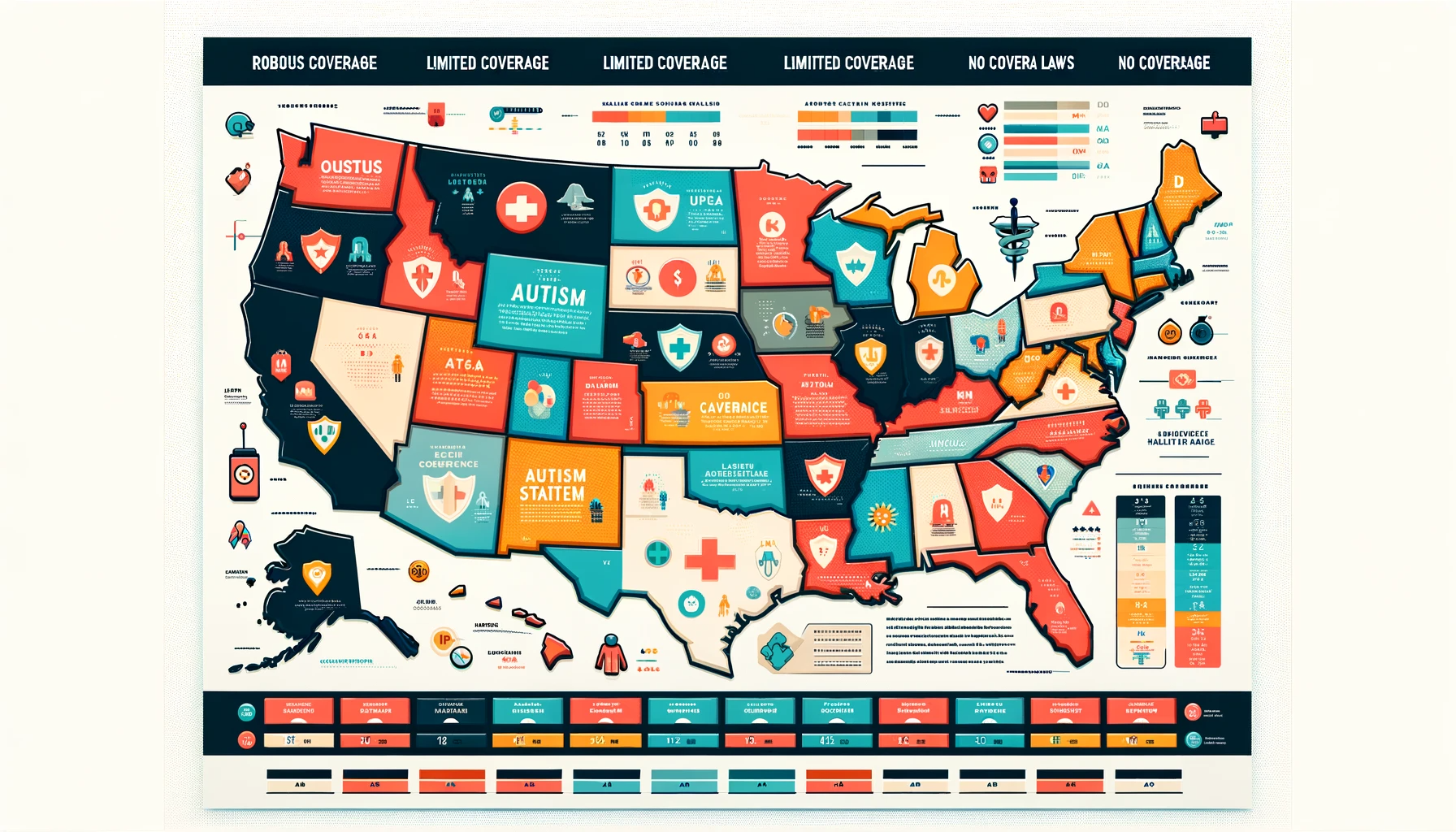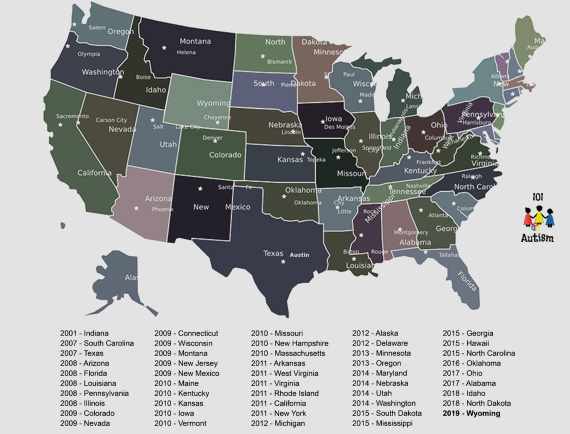Navigating Healthcare in 2024: A Comprehensive Guide for Families with Autism

In 2011, a groundbreaking initiative mandated insurance companies to cover autism therapies and services in more than 30 states. This State Autism Insurance Reform was a considerable triumph for families affected by autism spectrum disorder (ASD), providing access to crucial treatments and support services.
Over a decade later, the landscape of autism healthcare has continued to evolve. New policies have emerged, both expanding and limiting coverage in different states. Navigating healthcare systems remains complicated for these families. Staying informed and proactive is key.
That’s why I’ve created this comprehensive guide examining the current state of autism healthcare and offering practical tips for accessing the services you need in 2023.
The Current State of Autism Healthcare Coverage
Since 2011, progress has been made, but there is still a need for more balance across states. This map provides an overview of each state’s current standing:

Some positives since the 2011 reform:
- Autism insurance laws are now in place in 18 additional states, bringing coverage for evidence-based autism therapies to over 40 states.
- Several states have passed laws expanding required coverage beyond traditional behavioral therapies. 6 states now include assistive communication devices, while 11 include occupational, physical, and speech therapy.
However, setbacks include:
- Coverage limitations in several states due to narrow definitions of approved therapies or strict age cut-offs.
- Confusing bureaucratic processes for obtaining approvals and reimbursements.
- Insurance loopholes and technicalities are used to deny claims.
The uneven legal landscape means accessing healthcare still requires determination and know-how. The tips below can help families understand their rights and get optimal coverage.
Essential Healthcare Tips for Families with Autism
When navigating healthcare systems, advocating for your loved one is key. Here are some tried and tested tips:
Learn the specifics of your state’s autism healthcare laws.
- Know the therapies and services mandated for coverage, age ranges, and financial caps. State departments of insurance have user-friendly summaries.
- Note if any bills expanding coverage are pending. Supporting these bills helps create momentum.
Research your insurance plan’s autism coverage details.
- Don’t just trust provider directories. Call your insurer directly to confirm pre-approvals needed for therapies or doctors.
- Know copays, reimbursement processes, and how to dispute denials. Ask for an insurance case manager if needed.
Get medical necessity recommendations.
- Having assessments outlining required services aids approval. Many insurers allow just 20 therapy sessions before requiring re-authorization.
- Work closely with doctors and therapists to get detailed letters of medical necessity. Highlight how therapies align with symptoms and goals.
Learn tactics for motivation coverage denials.
- Don’t take no for an answer! Denials can often be appealed or reconsidered.
- Keep meticulous records of all communication with insurers. Take names and note call times.
- Frame appeals show how denying coverage hurts your child’s development. Enlist external advocates if needed.
Find community resources to supplement insurance.
- Many nonprofits, local agencies, and state programs offer low-cost or free services. Have these as a backup or to offset gaps in insurance coverage.
- Support groups provide solidarity and advice. Seek financial assistance programs if struggling with healthcare costs.
The key is persistence. Only allow insurers to honor mandated coverages. With preparation and assertiveness, optimal healthcare is possible.
Insights from the Experts
To offer additional perspective, I spoke with two experts who help families secure optimal autism services. Here are their insights:
Interview with Melanie Sharpe, Autism Insurance Specialist
“My top tip is: document everything. Keep detailed records of conversations with insurers and providers. Log phone calls, session approvals, reimbursement timelines – anything that shows the process. This creates an audit trail to dispute any denials and proves your diligence if complaints are needed. I’ve seen too many parents lose out when insurers claim ‘lack of information’ but can’t produce their supposed requests. Paper trails protect families’ rights.”
Interview with Dr. Timothy Reardon, Developmental Pediatrician
“Remember, insurance approval should be based on medical necessity, not financial motives. Insurers may initially deny valid therapies due to autism exclusions or coverage technicalities. But with the right assessments and persistence, these can often be overturned on appeal. I advise seeking thorough evaluations from experts that clearly validate the medical need for requested services. This solid evidence is harder to refute. Partnering with knowledgeable providers benefits the approval process.”
These experts emphasize the need for organization, self-education, and partnering with specialized providers. With their guidance, obtaining legally guaranteed coverage is possible.
Real Families Share Their Stories
To see these principles in action, here are two inspiring stories of families who navigated the healthcare system successfully:
The Hernandez Fought for ABA Coverage
When Hernandez’s 4-year-old son Danny was diagnosed with autism, they immediately sought applied behavior analysis (ABA) therapy, the gold standard treatment. Their insurer denied coverage, claiming ABA was “experimental” despite state mandates. The family persisted, obtaining medical assessments and legal counsel. After months of appeals, the insurer was compelled to cover Danny’s ABA, significantly improving his communication and development. The Hernandez’s determination helped Danny access life-changing therapy.
The Shahs Leveraged Multiple Programs
When Riya Shah’s teenage daughter Aanya began struggling with anxiety and self-care, Riya knew Aanya needed occupational therapy (OT) beyond what insurance covered. After researching options, Riya discovered Aanya qualified for state disability support services and an OT scholarship fund through a local nonprofit. By supplementing insurance with these additional resources, Aanya regained critical functional abilities. Riya’s resourcefulness allowed her to provide comprehensive therapies for Aanya.
These real-life stories demonstrate that with resilience and creativity, optimal autism healthcare is achievable even when obstacles arise.
Updated Resources and Support
There are numerous valuable resources available to assist families in navigating healthcare systems.
- State Autism Advocacy Organizations – Most states have autism societies offering personalized guidance on local coverage rules, provider choices, appeals assistance, and more.
- Autism Speaks Resource Guide – This site has an interactive map linking to state autism organizations and a comprehensive toolkit covering healthcare navigation strategies.
- The Autism Healthcare Accommodations Tool – This online tool, created by autistic self-advocates, helps create customized visual aids and communication supports for medical settings.
- Neurodiverse Affirming Provider Directories – Organizations like the Autistic Self Advocacy Network curate databases of providers committed to inclusive, supportive healthcare practices.
- PEAT Talks – This initiative provides free tele-education from autism experts on insurance, IEPs, transition planning, and more. Recordings are available online.
- Autism Services Peer Support Groups – Connecting with local families facing similar challenges provides community and collectively shared wisdom.
- Financial Assistance Programs – Resources like Autism Speaks’ Autism Treatment Fund and state Medicaid waivers help offset the costs of uncovered services.
Leveraging these support systems will smooth the path to securing optimal care.
Conclusion: Stay Proactive and Connected
Since 2011, progress has undoubtedly been made in autism healthcare coverage. However, securing needed services still requires effort for many. Hopefully, this guide has broken down today’s landscape and offered actionable tips.
As policies and technologies advance, it’s crucial families stay informed. Connecting with advocacy and peer support groups provides empowerment through community. With preparation and perseverance, you can ensure your loved ones access the healthcare they deserve.
What advice or stories can you share about navigating autism healthcare? What supports have helped your family? I invite you to share experiences in the comments to enlighten others facing this journey.



4 Responses
[…] Navigating Healthcare in 2023: A Comprehensive Guide for Families with Autism 2023 Autism insurance reform initiative map 2023 Autism insurance reform initiative map Please Be Patient I Have Autism Free PDF Download for t-shirt printings. […]
[…] Navigating Healthcare in 2023: A Comprehensive Guide for Families with Autism 2011 State Autism Insurance Reform Initiative Map […]
[…] Navigating Healthcare in 2023: A Comprehensive Guide for Families with Autism […]
[…] Navigating Healthcare in 2023: A Comprehensive Guide for Families with Autism […]